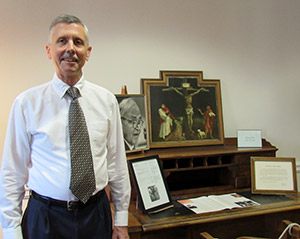 This month John Burgess, James Henry Snowden Professor of Systematic Theology, will join the seven other Fellows of the Barth Translators’ Seminar for their annual meeting. All eight scholars—who hail either from Germany, Canada, or one of several universities across the United States—have committed themselves to translating the later collected writings of Karl Barth as part of the Gespräche project.
This month John Burgess, James Henry Snowden Professor of Systematic Theology, will join the seven other Fellows of the Barth Translators’ Seminar for their annual meeting. All eight scholars—who hail either from Germany, Canada, or one of several universities across the United States—have committed themselves to translating the later collected writings of Karl Barth as part of the Gespräche project.
“Princeton’s Center for Barth Studies has gathered as much literature as possible both by and about Karl Barth,” John notes. The Barth Translators’ Seminar “exists to foster the English-language reception of Karl Barth’s literary corpus by . . . publishing [in English] . . . as yet unavailable Barth resources for the church and academy.”
“Later in his life,” says John, “Barth made public presentations of his ideas in a more conversational format, as opposed to formal lecturing. At conferences, for example, he would request a set of questions from the organizers and would then respond to them in a more relaxed, extemporaneous style.” This approach made for a “delightful” overview of his thinking on themes that were important to him, but in language that was neither particularly difficult nor complex.
A Fellow of the Seminar for the past five years, John has contributed German-to-English translations to a soon-to-appear volume of Barth’s writings from 1959-1962 (being published by InterVarsity Press), as well as to a corpus of writings from 1963 (which will also appear in published form). This year, the Seminar will address a group of writings from 1964-1968.
“These collections are good starting places for people just beginning to read Barth,” John observes. “They address the same broad themes as Barth’s Church Dogmatics but in a less daunting format. Their conversational style makes them more personal and reflective, and they bring out Barth’s sense of humor, his love of reading Scripture and thinking about the big questions of faith, and his joy in thinking theologically. In fact, these collections show how natural such activities were for Karl Barth.”
Annually, members of the Seminar—headed by Karlfried Froehlich and Darrell Guder—are assigned sections of material to translate over the course of the year. In June, they meet to exchange ideas, answer questions, and give feedback on each other’s work. After the annual meeting, they make revisions to their translations and submit them for finalizing and publication. Dr. Burgess’s current term as a Fellow of the Seminar runs through 2017.
Image: Professor Burgess stands in front of Karl Barth's desk. Dr. Markus Barth, son of Karl Barth and former PTS faculty member, donated his father’s desk and chair to the Seminary in 1964. Included with the gift of the desk at which Barth wrote his theological works is an autographed copy of his Kirchliche Dogmatic I/1. The desk is presently on display in the Hansen Reading Room on the second floor of the library.
